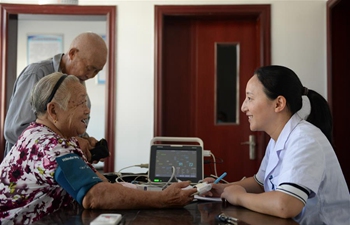NAIROBI, Aug. 7 (Xinhua) -- A choking smell of medicine masks the air inside Jane Mutisya's tiny house in Nairobi's Mathare slums. In one corner of her single-roomed house is a pile of prescriptions that her life is pegged on.
Mutisya has been battling cervical cancer for the last six months. Her husband had to juggle between work and taking care of her as the disease had immobilized the once active lady.
The effects of treatment are written all over her body. The more than ten types of tablets and syrups have sucked life out her body leaving her pale, frail and weak. Even feeding herself is such a hard task.
Mutisya was diagnosed with stage four cervical cancer in February. She has already undertaken a few sessions of chemotherapy but her situation seems to be deteriorating.
"The last six months have been the hardest in my life, my wife threw in the towel the moment we got the results from her doctor. She still doesn't believe she is alive as the results were really bad, apart from the pain that becomes unbearable sometimes, she has been responding well to treatment but her doctor has prepared us for any eventuality," George Mulwa, Mutisya's husband said.
Their children, two daughters and a son are all below 12 years. They know their mother is suffering from cancer but they still cling on to hope that she will soon climb out of her bed and prepare for them their favorite meal of rice and bean stew.
"It has been hard explaining to the children where their mother is ailing from...our second born daughter asked me whether their mother would die of cancer too, I was at pains trying to explain the treatment process and what to expect in such situations," said Mulwa.
A few meters from Mutisya's house, is Jacinta Wambui's home and she is also battling cervical cancer. Wambui's cancer is at stage two. In her mid-twenties, she remains optimistic she will conquer this monster and pursue her dream of being a nurse.
"I woke up one day and noticed blood stains on my bedding, yet I was not in my periods. My mother asked me to go for a checkup in one of the clinics nearby, they conducted a number of tests after which I was given some medicine. The first diagnosis was hormonal imbalance, but the prescription did not work. My next stop was Kenyatta National Hospital where I was diagnosed with cervical cancer," said Wambui.
Statistics from the ministry of health show that cervical cancer claims about 2,451 lives every year. Cervical cancer is the second most common cancer among women in Kenya and the biggest contributor to cancer deaths.
Catherine Nyongesa, a Nairobi-based oncologist said that despite cervical cancer being a leading cause of death among Kenyan women, it is among the few cancers one can be vaccinated and protected against.
If Mutisya and Wambui had been immunized against the disease before they got sexually active, their chances of getting sick could be almost zero, said Nyongesa.
Notably, the vaccine is administered to girls between the ages of 10 and 14. In some schools in Kenya, it is now mandatory for girls in that age bracket to get the vaccine and one has to provide proof before admission.
The ministry of health and partners rolled out the vaccine in May after a successful piloting in four schools in lower eastern Kenyan county of Kitui.
Statistics by the World Health Organization indicate that in the absence of any new intervention, Kenya is likely to grapple with about 6,000 new cases of cervical cancer by 2025.
However, at least 63 per cent of cervical cancer cases could be averted if 90 per cent coverage is reached with HPV vaccines.













